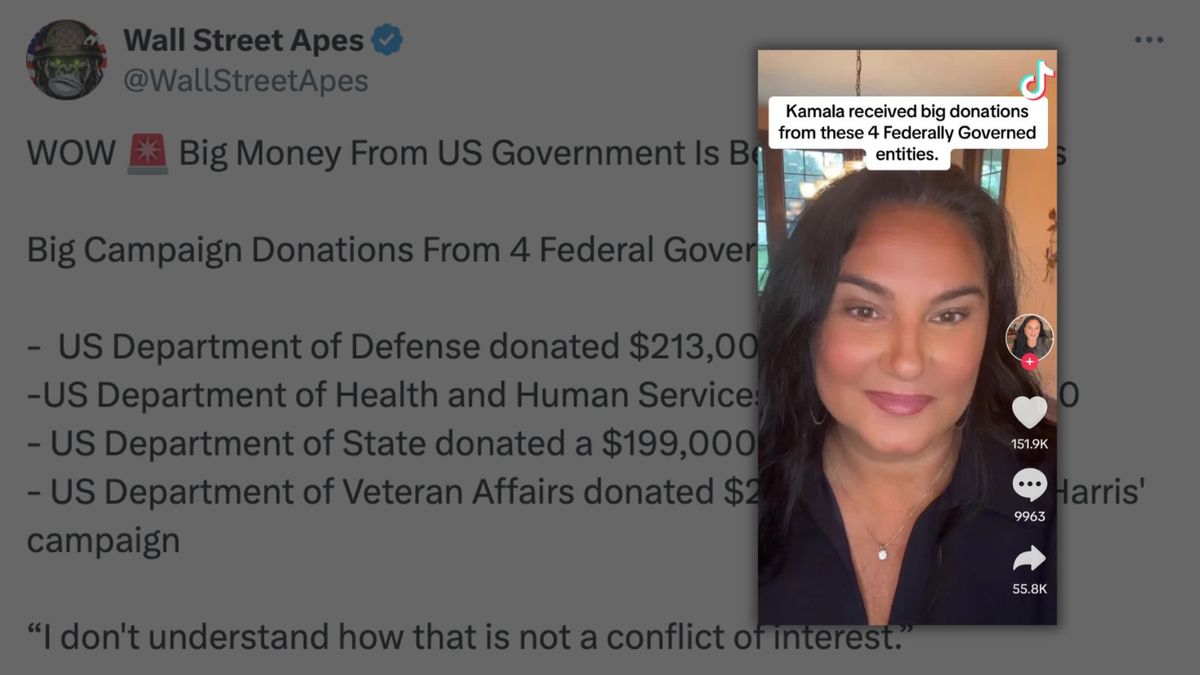The donations did not come from the agencies themselves, but from individuals who work for them.
As the 2024 U.S. presidential campaign gathered momentum in late August, a claim that four U.S. federal agencies had donated to Vice President Kamala Harris' campaign spread online.
One X user claimed the Department of Defense (DOD), the Department of Health and Human Services (HHS), the Department of State (DOS) and the Department of Veterans Affairs (VA) had all contributed six-figure sums to the Democratic candidate's cause by late August (archived).
The X user also shared a TikTok video of a woman making the same claim (archived).

Together, the X post and TikTok video had amassed more than 2.6 millions views as of this writing.
"Why are our tax dollars funding campaigns," one TikTok user commented. "Isn't that against the law?" another asked.
https://www.tiktok.com/@unapologeticallysouthern/video/7407430882597850398
Asked if she could provide a source for her claims, the TikTok user who posted the in-question video then published another recording where she claimed to quote Open Secrets, a nonprofit and nonpartisan organization dedicated to tracking money in politics (archived):
However, an email exchange with Open Secrets and further evidence revealed the claims were false.
Listed Agencies Didn't Donate to Harris Campaign
§ 734.503 Allocation and reimbursement of costs associated with political activities.
The costs associated with the political activities described in § 733.502(c) of this chapter may not be paid for by money derived from the Treasury of the United States. Costs associated with a political activity are deemed not to be paid for by money derived from the Treasury of the United States if the Treasury is reimbursed for the costs within a reasonable period of time.
The Hatch Act also prohibits federal employees from taking part in certain political activities to ensure a nonpartisan administration of the programs they carry out.
Open Secrets tracks donations and outlines the organizations they come from. On pages that detail donations that come from federal agencies, it included the disclaimer:
NOTE: Organizations themselves cannot contribute to candidates and party committees. Figures on this page include contributions and spending by affiliates.
By "affiliates," Open Secrets described organizations that depend on a given federal agency. For example, affiliates of the DOD include the Air National Guard or the Defense Health Agency, among others.
A request for clarification from Open Secrets showed that the donations listed under each federal agency came from its employees.
"It's safe to assume that 100% of the money described here is coming from employees of these various government agencies," Open Secrets individual contributions researcher Alex Baumgart wrote in an email. "There really isn't any other way for money affiliated with a government agency to make its way to a political candidate." Therefore, donations from individuals are legal.
In fact, donations from federal employees can go to either party and either presidential candidate. For example, as of this writing in the 2024 election cycle, DOD employees had collectively donated $242,906 to former U.S. President Donald Trump and $206,429 to Harris. However, as a whole, Democratic federal candidates had received 56.87% of the donations, while Republican federal candidates had received 43.13% of the donations from DOD employees.
Meanwhile, a large majority of HHS employees had donated to the Democratic party (94.3%) — giving $194,717 to Harris and $28,307 to Trump.
The picture at the DOS was more complex. While employees had made a large donation to the Republican National Committee ($708,510) — the largest they made by far — they had given more to Harris ($191,972) than Trump ($18,475).
Lastly, VA employees had donated nearly twice as much to Harris ($203,508) than to Trump ($117,718).
Open Secrets can keep track of donations because the law states parties and campaigns must keep receipts and records of all contributions.

